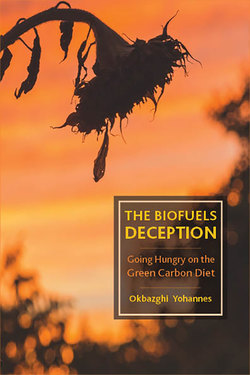The Biofuels Deception

Реклама. ООО «ЛитРес», ИНН: 7719571260.
Оглавление
Okbazghi Yohannes. The Biofuels Deception
Отрывок из книги
THE BIOFUELS DECEPTION
Going Hungry on the Green Carbon Diet
.....
By the turn of the twentieth century, the world was producing 100 million metric tones of petroleum-derived reactive nitrogen annually to grow livestock feed alone. Unsurprisingly, livestock populations are responsible for emissions of 2.4 billion metric tons of carbon dioxide per annum, from combinations of livestock-driven deforestation, soil cultivation, land deterioration, desertification, and reactive nitrogen mobilization. Again, it is no accident that the current mode of livestock production accounts for 65 percent of anthropogenic nitrous oxide emissions 37 percent of methane emissions, and for 64 percent of anthropogenic ammonia emissions, which generates acid rain and causes acidification of vast areas in the world. The anthropogenic disturbance of soils related to the expansion of feed-crop production in particular has far-reaching ramifications for the earth’s carbon balance, since soils are the largest reservoir of carbon, storing between 1,100 billion and 1,600 billion metric tons, compared with 560 billion metric tons contained in living vegetation and 750 billion metric tons in the atmosphere. It is estimated that pasture production–induced oxidation alone results in 100 million metric tons of CO2 emissions per annum, accompanied by 3 billion metric tons of CO2 emissions from the respiratory processes of livestock production, 86 million metric tons of methane from enteric fermentation, and 17.4 million metric tons of methane emissions from manure decomposition.44
The ecological and atmospheric impacts of industrial livestock are compounded by a global meat manufacturing system that is fully integrated into the agrochemical and pharmaceutical manufacturing systems. In the United States, 37 percent of pesticides and 50 percent of antibiotics are consumed in the livestock sector. The amounts of the chemical compounds, antibiotics, and growth hormones not assimilated by livestock and their feed crops are put back into the environment; 50 percent of synthetic nitrogen applied to crop production is released and enters downstream natural assets with far-reaching impacts on ecosystem functions. Since capital accumulation in the livestock sector and accumulation in the chemical/pharmaceutical manufacturing system have now become coterminous, the combined effects of production in the two realms will continue to have a force multiplier effect of degradation on ecosystem functions. For example, the annual global emissions of air-polluting ammonia grew from 18.8 million metric tons at the beginning of the twentieth century to 56.7 million metric tons by the 1990s and is now conservatively projected to increase to 116 million metric tons by 2050.45
.....